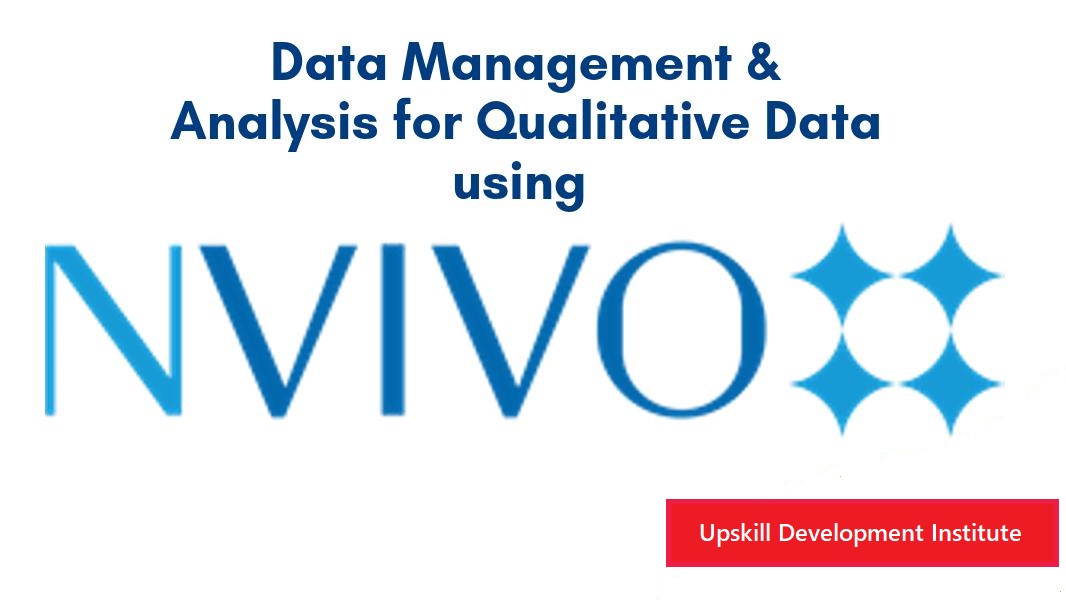Introduction
This course is designed for participants who plan to use NVIVO for the management, coding, analysis and visualisation of qualitative data. The course’s content is spread over four modules and includes setting up an NVIVO project and organising data; coding data, working with case and attributes; seeking patterns and identifying relationships across data, and presenting findings using graphic displays. The course is entirely hands-on and uses sample data to learn NVIVO’s basics and advanced features.
Managing and analyzing qualitative data can be a trying experience. Qualitative data is multifaceted, rich in nature, unstructured and at times can be overwhelming where the researcher will be provided with information beyond the scope of the study. Combining qualitative research data management and data analysis with technology is frowned upon by some qualitative researchers. Qualitative researchers now have the option to apply technology tools in their approach for data management and data analysis to ease the complexity of the research process.
This course aims to build the capacity of qualitative researchers in qualitative data management and analysis using NVIVO qualitative software. This software has many features that can assist to simplify the whole process of doing qualitative research.
Related courses – click the course title to view the course outline
o Research Design, Mobile Data Collection and Data Analysis using NVIVO and Stata Course
o Research Design, Mobile Data Collection and Data Analysis using NVIVO and R Course
o Research Design, Mobile Data Collection and Data Analysis using NVIVO and SPSS Course
Duration
5 days
Who Should Attend?
Statistician, analyst, or a budding data scientist and beginners who want to learn how to analyse data with NVIVO
Course Objective:
o Understand how to set up a project in NVivo
o Understand how to import, create and work with codes and nodes in NVivo
o Manage all your material conveniently in one project file, easily work with material in your own language
o Effortlessly share your work with others
o Easily manage your information and enhance your internal workflow and reporting processes
Course content
Understanding Qualitative Research
o Qualitative Data
o Types of Qualitative Data
o Sources of Qualitative data
o Qualitative vs Quantitative
o NVivo key terms
o The NVivo Workspace
Preliminaries of Qualitative Data Analysis
o What is qualitative data analysis
o Approaches in Qualitative data analysis; deductive and inductive approach
o Points of focus in analysis of text data
o Principles of Qualitative data analysis
o Process of Qualitative data analysis
Introduction to NVIVO
o NVIVO Key terms
o NVIVO interface
o NVIVO workspace
o Use of NVIVO ribbons
NVIVO Projects
o Creating new projects
o Creating a new project
o Opening and Saving project
o Working with Qualitative data files
o Importing Documents
o Merging and exporting projects
o Managing projects
o Working with different data sources
Nodes in NVIVO
o Theme codes
o Case nodes
o Relationships nodes
o Node matrices
o Type of Nodes,
o Creating nodes
o Browsing Nodes
o Creating Memos
o Memos, annotations and links
o Creating a linked memo
Classes and summaries
o Source classifications
o Case classifications
o Node classifications
o Creating Attributes within NVivo
o Importing Attributes from a Spreadsheet
o Getting Results; Coding Query and Matrix Query
Coding
o Data-driven vs theory-driven coding
o Analytic coding
o Descriptive coding
o Thematic coding
o Tree coding
Thematic Analytics in NVIVO
o Organize, store and retrieve data
o Cluster sources based on the words they contain
o Text searches and word counts through word frequency queries.
o Examine themes and structure in your content
Queries using NVIVO
o Queries for textual analysis
o Queries for exploring coding
Building on the Analysis
o Content Analysis; Descriptive, interpretative
o Narrative Analysis
o Discourse Analysis
o Grounded Theory
Qualitative Analysis Results Interpretation
o Comparing analysis results with research questions
o Summarizing finding under major categories
o Drawing conclusions and lessons learned
Visualizing NVIVO project
o Display data in charts
o Creating models and graphs to visualize connections
o Tree maps and cluster analysis diagrams
o Display your data in charts
o Create models and graphs to visualize connections
o Qualitative report format
o Reporting qualitative research
o Reporting content
o Interpretation
o Create reports and extracts
Triangulating results and Sources
o Triangulating with quantitative data
o Using different participatory techniques to measure the same indicator
o Comparing analysis from different data sources
o Checking the consistency on respondent on similar topic
Report Writing
Training Approach
This course will be delivered by our skilled trainers who have vast knowledge and experience as expert professionals in the fields. The course is taught in English and through a mix of theory, practical activities, group discussion and case studies. Course manuals and additional training materials will be provided to the participants upon completion of the training.
Tailor-Made Course
This course can also be tailor-made to meet organization requirement. For further inquiries, please contact us on: Email: training@upskilldevelopment.com Tel: +254 721 331 808
Training Venue
The training will be held at our Upskill Training Centre. We also offer training for a group at requested location all over the world. The course fee covers the course tuition, training materials, two break refreshments, and buffet lunch.
Visa application, travel expenses, airport transfers, dinners, accommodation, insurance, and other personal expenses are catered by the participant
Certification
Participants will be issued with Upskill certificate upon completion of this course.
Airport Pickup and Accommodation
Airport pickup and accommodation is arranged upon request. For booking contact our Training Coordinator through Email: training@upskilldevelopment.com, +254 721 331 808
Terms of Payment: Unless otherwise agreed between the two parties payment of the course fee should be done 3 working days before commencement of the training so as to enable us to prepare better

